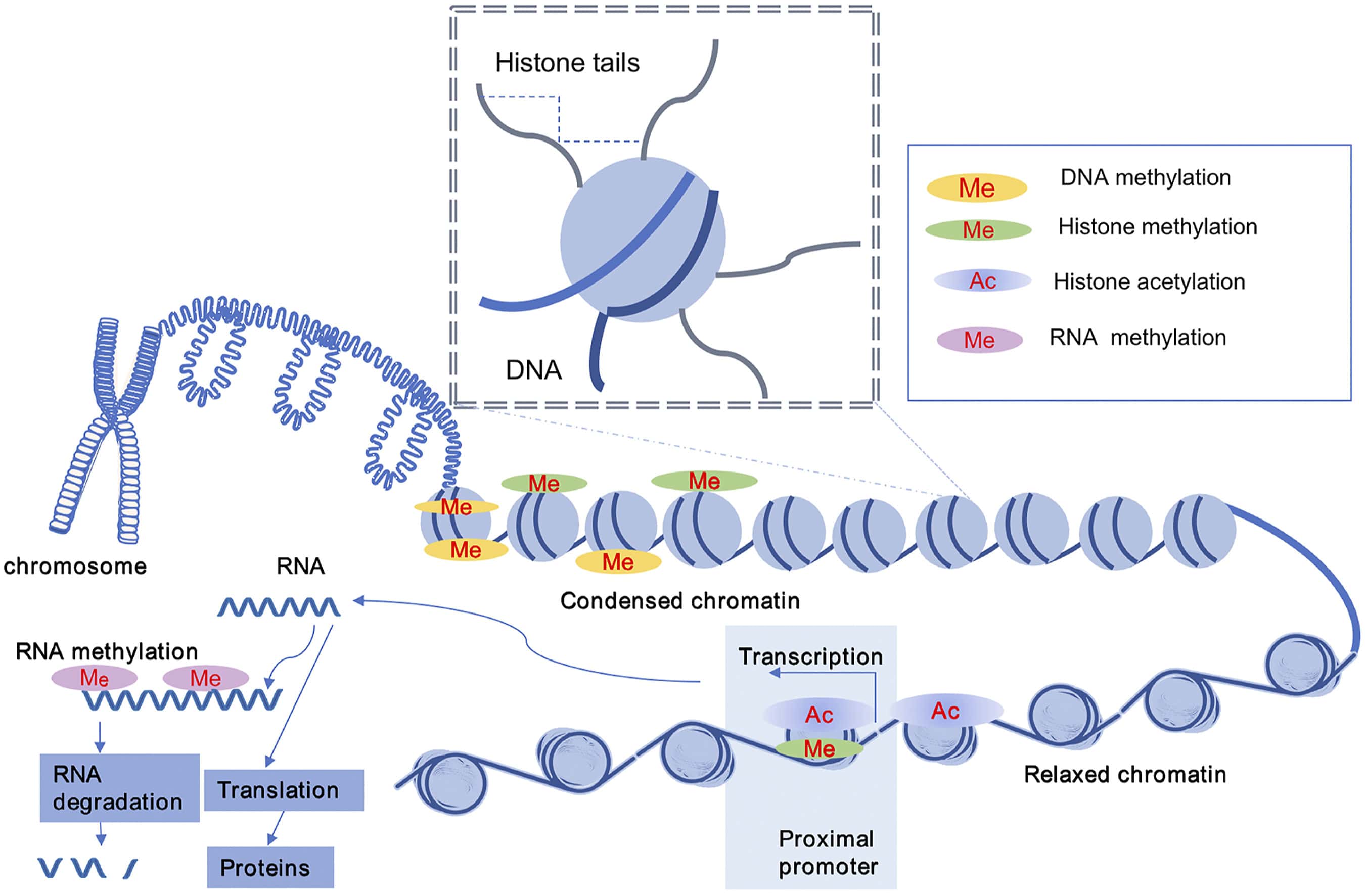
Epigenetic modifications are a fascinating field of study within the realm of biology. These modifications refer to changes in gene expression that do not involve alterations to the underlying DNA sequence. Instead, they involve chemical modifications to the DNA molecule or to the proteins associated with it. Epigenetic modifications have been found to play a crucial role in various biological processes, including development, aging, and disease.
In this article, we will delve into 17 surprising facts about epigenetic modifications that shed light on their significance and complexity. From the influence of environmental factors on epigenetics to the potential role of epigenetic modifications in passing down traits from one generation to the next, we will explore the latest research and discoveries in this intriguing field. So, strap in and get ready to uncover some mind-blowing facts about the intricate world of epigenetic modifications!
Key Takeaways:
- Epigenetic modifications influence gene expression and can be inherited, impacted by lifestyle choices, and targeted for therapeutic interventions. They play a crucial role in health and disease, offering potential for personalized medicine.
- Epigenetic modifications are reversible, influenced by environmental factors, and can affect behavior and cognition. They are a rapidly evolving field of research with the potential to unlock new insights and therapeutic targets.
Epigenetic modifications influence gene expression.
Epigenetic modifications are chemical changes that can modify the structure of DNA and its associated proteins, without altering the underlying genetic code. These modifications play a critical role in regulating gene expression, determining which genes are turned on or off in different cells and tissues.
Epigenetic modifications can be inherited.
Epigenetic modifications can be passed down from one generation to another. This means that the environmental factors and experiences of our ancestors can influence the epigenetic marks on our genes and potentially impact our health and susceptibility to certain diseases.
Epigenetic modifications can be influenced by lifestyle choices.
Factors such as diet, exercise, stress, and exposure to environmental toxins can all impact epigenetic modifications. Making healthy lifestyle choices, such as maintaining a balanced diet and managing stress levels, can help promote favorable epigenetic patterns.
Epigenetic modifications play a role in development and aging.
During development, epigenetic modifications guide the specialization of cells into different types, such as muscle cells or nerve cells. Additionally, changes in epigenetic patterns can occur throughout life and contribute to the aging process.
Epigenetic modifications can be reversible.
Unlike changes in the DNA sequence, epigenetic modifications are reversible. This means that it is possible to modulate and potentially restore normal gene function by targeting and modifying these epigenetic marks.
Epigenetic modifications can be influenced by environmental factors.
Exposure to environmental factors, such as chemicals, pollutants, and even certain medications, can lead to changes in epigenetic patterns. Understanding these environmental influences can provide insights into the development of diseases and inform preventative strategies.
Epigenetic modifications can be heritable but dynamic.
Epigenetic modifications can be both heritable and dynamic, meaning they can be stably inherited but also modified in response to external stimuli. This dynamic nature allows organisms to adapt and respond to changes in their environment.
Epigenetic modifications can be influenced by social interactions.
Social interactions and experiences can impact epigenetic patterns. Studies have shown that social isolation or stress can lead to changes in epigenetic markers, highlighting the connection between our social environment and our gene expression.
Epigenetic modifications can be influenced by maternal factors.
The maternal environment plays a crucial role in shaping the epigenetic landscape of the developing fetus. Factors such as maternal diet, stress levels, and exposure to toxins can all impact the epigenetic patterns that are established during early development.
Epigenetic modifications can affect susceptibility to diseases.
Changes in epigenetic patterns have been linked to the risk of various diseases, including cancer, cardiovascular diseases, and neurodevelopmental disorders. Understanding these epigenetic changes could lead to the development of targeted therapies and personalized medicine approaches.
Epigenetic modifications can be targeted for therapeutic interventions.
The reversible nature of epigenetic modifications has opened up new avenues for therapeutic interventions. Researchers are exploring the potential of targeting specific epigenetic marks to treat diseases and restore normal gene function.
Epigenetic modifications can be influenced by early-life experiences.
Early-life experiences, such as prenatal development and early childhood experiences, can have a lasting impact on epigenetic patterns. These early-life epigenetic modifications can shape our health and wellbeing throughout our lifespan.
Epigenetic modifications can vary between individuals.
Epigenetic patterns can vary between individuals, even among identical twins. This variation can contribute to differences in gene expression and may explain why individuals with the same genetic background can have different health outcomes.
Epigenetic modifications can be studied using advanced technologies.
Advances in technology have revolutionized the study of epigenetic modifications. Techniques such as DNA methylation profiling and chromatin immunoprecipitation sequencing allow researchers to investigate epigenetic marks on a genome-wide scale.
Epigenetic modifications can be influenced by nutrition.
Nutritional factors, such as the availability of certain vitamins and minerals, can impact epigenetic patterns. For example, folate, a B vitamin found in leafy greens, plays a crucial role in methylation, one of the key epigenetic modifications.
Epigenetic modifications can influence behavior and cognition.
Epigenetic modifications can affect brain development and function, influencing behaviors and cognitive abilities. Changes in epigenetic patterns have been associated with conditions such as addiction, depression, and cognitive disorders.
Epigenetic modifications are a rapidly evolving field of research.
The study of epigenetic modifications is a rapidly evolving field, with new discoveries and insights emerging regularly. Scientists are constantly unraveling the complexities of epigenetics to better understand its role in health, disease, and human development.
In conclusion, the 17 surprising facts about epigenetic modifications highlight the intricate and fascinating world of gene regulation beyond genetic coding. Epigenetic modifications hold the key to understanding how our genes are expressed and influenced by environmental factors and experiences. They have the potential to not only shed light on various diseases but also provide therapeutic targets for interventions. As research in this field progresses, we can expect to uncover even more surprising facts and unlock the full potential of epigenetics in transforming healthcare and personalized medicine.
Conclusion
In conclusion, epigenetic modifications are a fascinating area of study that have revolutionized our understanding of how gene expression is regulated. These modifications play a crucial role in various biological processes, including development, aging, and disease. Through the addition or removal of chemical marks on our DNA and histone proteins, epigenetic modifications can determine which genes are turned on or off without altering the underlying DNA sequence.
By exploring the 17 surprising facts about epigenetic modifications, we have delved into the intricate mechanisms that govern our genetic destiny. From the heritability of epigenetic marks to their role in environmental adaptation, these facts highlight the complexity and fluidity of our epigenome. Understanding these facts can not only shed light on normal physiological processes but also pave the way for new insights into diseases and potential therapeutic interventions.
As research continues in this field, we can expect even more surprising discoveries that will unravel the mysteries of epigenetic modifications and their implications for human health and biology.
FAQs
1. What are epigenetic modifications?
Epigenetic modifications are chemical changes that occur on our DNA and histone proteins, which can affect gene expression without altering the underlying DNA sequence.
2. How do epigenetic modifications impact gene expression?
Epigenetic modifications can determine whether a gene is turned on or off, effectively regulating its expression. They can either promote or repress gene activity, influencing various biological processes.
3. Are epigenetic modifications heritable?
Yes, some epigenetic modifications can be passed down from one generation to the next. This phenomenon is known as transgenerational epigenetic inheritance.
4. What factors can influence epigenetic modifications?
Various factors, including environmental exposures, diet, lifestyle choices, and stress, can impact epigenetic modifications. These external factors can leave a lasting imprint on our epigenome.
5. Can epigenetic modifications be reversed?
Yes, epigenetic modifications can be reversible. Certain enzymes can add or remove chemical marks on DNA and histone proteins, allowing for dynamic changes in gene expression.
6. Are epigenetic modifications linked to diseases?
Yes, aberrant epigenetic modifications have been implicated in various diseases, including cancer, neurological disorders, and metabolic conditions. Understanding these modifications can provide valuable insights for developing targeted therapies.
7. Do epigenetic modifications change throughout our lifespan?
Yes, epigenetic modifications can change in response to aging processes and environmental influences. These changes can contribute to age-related diseases and impact overall health.
8. Can epigenetic modifications be inherited across generations?
Transgenerational epigenetic inheritance suggests that certain epigenetic modifications can be inherited by offspring, potentially influencing their health and development.
9. Are there any interventions to modify epigenetic marks?
Scientists are exploring various ways to modulate epigenetic marks, including the use of small molecules, gene therapies, and lifestyle interventions. These approaches hold promise for targeted treatments and prevention strategies.
10. How are epigenetic modifications relevant to personalized medicine?
Epigenetic modifications can provide valuable insights into an individual’s response to certain drugs and therapies. Understanding a person’s unique epigenetic profile can enable targeted and personalized treatment plans.
Epigenetic modifications offer a captivating glimpse into how our genes respond to environmental influences. Beyond the surprising facts about epigenetics, delving deeper reveals even more intriguing insights. Unraveling the mysteries of DNA methylation provides a fascinating look at how this process shapes gene expression. Exploring the groundbreaking work of pioneering researchers like Dr. Rudolf Jaenisch sheds light on the incredible advancements in this field. Moreover, understanding the intricate mechanisms of gene expression regulation opens up a world of possibilities for future research and potential applications. Continue your journey into the captivating world of epigenetics and genetics with these engaging articles.
Was this page helpful?
Our commitment to delivering trustworthy and engaging content is at the heart of what we do. Each fact on our site is contributed by real users like you, bringing a wealth of diverse insights and information. To ensure the highest standards of accuracy and reliability, our dedicated editors meticulously review each submission. This process guarantees that the facts we share are not only fascinating but also credible. Trust in our commitment to quality and authenticity as you explore and learn with us.


